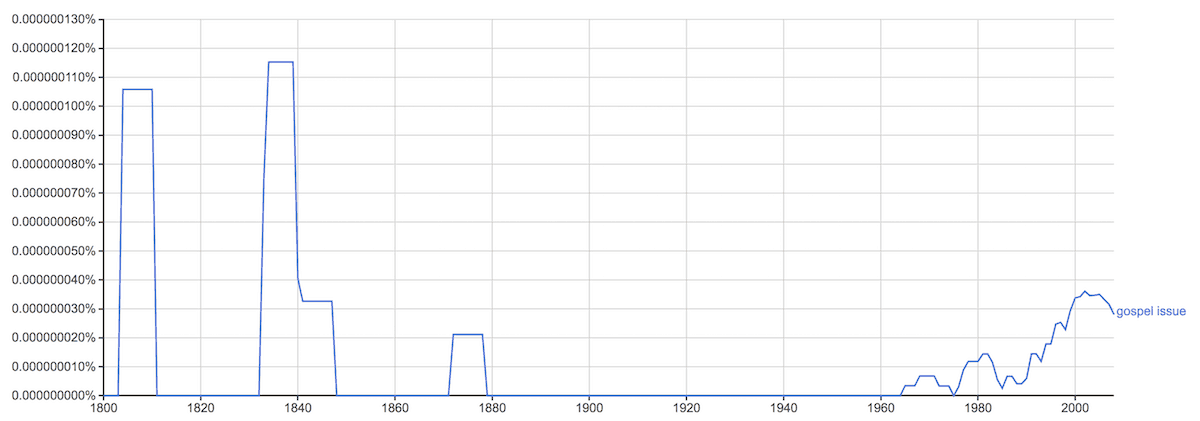My guess is you’ve probably heard someone use the phrase “gospel issue.” You may well have used it yourself a few times. But what is a gospel issue? What does this phrase mean? I did some searching around to see what counts as a gospel issue and found quite an extensive list. According to at least someone, each of these is a gospel issue:
The doctrine of election, the treatment of animals, creation care and conservation, racial reconciliation, racial diversity, abortion, social justice, gender roles, love, transgenderism, marriage, religious liberty, the historicity of Adam, global debt, forgiveness, anxiety, church health, and vocation.
This is quite a list and perhaps makes the question even more interesting: What constitutes a gospel issue? Is there anything that doesn’t count as a gospel issue? Is there any agreement among Christians as to what does and does not constitute one?
As I searched my library and Google Ngram Viewer, I found the phrase “gospel issue” has been used quite often over time, but that its meaning has shifted. In the past, it was used in at least four ways: 1) Authors would teach how the gospel issues in obedience (e.g. “Unless the gospel issues in new lifestyle it means very little.”); 2) periodicals would sometimes announce a gospel issue dealing with the gospel of Jesus Christ; 3) magazines would release a gospel issue focused on gospel music; 4) missionaries would tell how the message of the gospel issues forth through their labor (e.g. “From hence may the gospel issue and pervade all India.”).

Yet none of those quite captures how it is used today, and that always makes me just a tad cautious. I want to be careful adding new terms to our collective lexicon, and especially when we are assigning them a lot of importance (e.g. “gospel-centered”).
Before R. Scott Clark provides a critical analysis of the term, he defines it like this: a gospel issue is “one that is essential to a right understanding and practice of the Christian life for those who believe the gospel.” If we get these gospel issues wrong, then, we will have a false understanding of Christian doctrine and we will not live out a faithful Christian life. Clark goes on to explain why this usage is problematic: “It seems that the expression ‘gospel issue’ is a rhetorical move to lend urgency, moral, and spiritual significance to a given point of view.” In this way “gospel issue” is used as a kind of hammer to drive home the urgency of a particular doctrine or practice. He believes the best use of the phrase is to restrict it to matters of the gospel itself and not to its many implications. “The only proper ‘gospel issue’ is the gospel itself,” he says. The substitutionary atonement of Jesus Christ? That’s a gospel issue. Caring for animals? That’s not a gospel issue.
D.A. Carson looked at the term in an issue of Themelios and there he points out a similar concern to Clark. He says that since the gospel is the matter of supreme importance, “if X is a gospel issue, it too is similarly elevated in importance. It follows, then, that to abandon X, when X is a gospel issue, is somehow to diminish or threaten the gospel.” He also points out that the difficulty with the phrase is that, rightly understood, everything relates to the gospel in one way or another and, thus, can be described as a gospel issue. The phrase will remain useful only if it describes topics that, if we deny them, begin to destroy our understanding of the gospel of Jesus Christ. Of course, for this to be true we must agree upon an understanding of the gospel, a matter we can hardly take for granted. Thus what constitutes a gospel issue for some people will differ radically from others.
I believe Carson summarizes the matter well: “To affirm something is or is not a gospel issue is not a transparent expression. It is likely to be clearest among those who share a common confession as to what the gospel is. It is useful only when it means something more stringent than that X can be tied in some way to the gospel: one must show that without this X the gospel itself is seriously threatened.” This is key: “It is always wise to recognize that some topics are hugely important on grounds other than gospel issues and that our choice of topics is generated in part by our perception of the threats and errors of our own age.” In other words, it’s not necessary to demand a doctrine is acknowledged as a gospel issue in order to affirm its importance.
Speaking personally, I have probably used the phrase “X is a gospel issue” from time to time, but have been trying not to. I want to find more helpful, more accurate, and more time-tested ways to distinguish between issues that are absolutely central to a right understanding of the Christian faith and those that, though still important, are peripheral. I especially want to ensure I’m not labeling my pet doctrine a gospel issue simply as a means to prevail in arguments. After all, if everything’s a gospel issue, I guess nothing’s a gospel issue.










